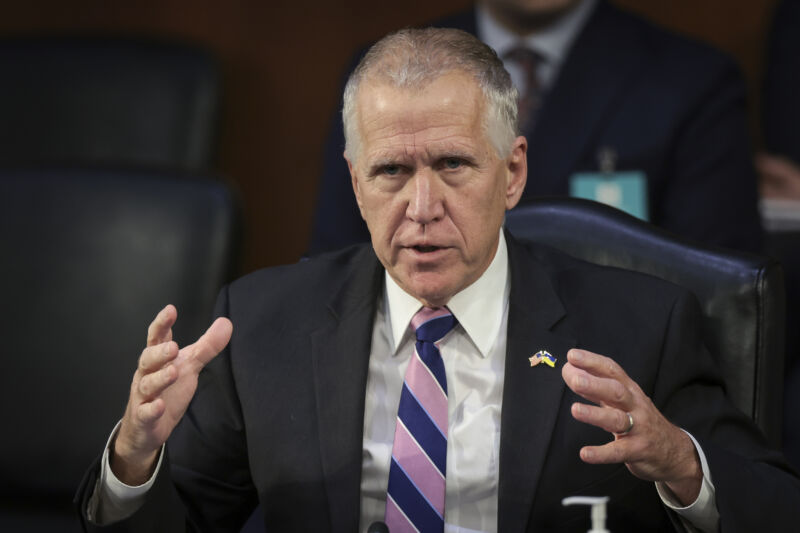
Two senators have introduced legislation that would give the US Copyright Office power to mandate the adoption of anti-piracy technology across the Internet. Websites that failed to comply would face damages as high as $150,000 on the first offense. The bill, known as the SMART Copyright Act, is co-sponsored by Sen. Thom Tillis (R-N.C.) and Vermont Sen. Patrick Leahy, one of the Senate's most senior Democrats.
"In the fight to combat copyright theft, there is currently no consensus-based standard technical measures and that needs to be addressed," Tillis said in a press release last month.
But opponents dispute that. A letter signed by a coalition of public interest and tech industry lobbying groups argues that "this proposal would also put an agency with no engineering or other relevant expertise in charge of how digital products are designed." Moreover, they said the legislation "risks corruption and capture from specific businesses and vendors pitching their own products."
It's not clear when—or even if—this legislation will come up for a vote. Traditionally, a bill like this would be considered by a Senate committee before making its way to the Senate floor. But as Congress has become more dysfunctional, it has become increasingly common for bills like this to get attached at the last minute to gargantuan "must-pass" spending bills.
For example, in December 2020, Tillis introduced legislation to make it a felony to run a pirate streaming site. Just two weeks later, the proposal was attached to the massive 5,600-page, $900 billion COVID spending bill. As a result, Tillis' bill became law before most lawmakers—to say nothing of the general public—had time to read it.
We don't know if something similar will happen with the SMART Copyright Act. But we thought it would be worth digging into the legislation now, just in case.
A new approach to filtering
Congress last did a comprehensive overhaul of copyright law with the 1998 Digital Millennium Copyright Act. That law included the notice-and-takedown system that's familiar to many Internet users. Under this system, online service providers are shielded from liability for copyright infringement if they promptly take down potentially infringing material when notified to do so by copyright holders.
This "safe harbor" rule included many caveats, including a requirement that a service provider "accommodates and does not interfere" with "standard technical measures." Lawmakers envisioned copyright holders and online service providers working together to develop an industry standard for watermarking copyrighted content. Then they hoped service providers could automatically flag and take down watermarked content if the owner didn't authorize it.
But almost a quarter-century later, that hasn't happened. The courts haven't identified any "standard technical measures" that online service providers must accommodate. Instead, most major platforms have developed proprietary filtering technologies tailored to their needs. YouTube, for example, has a system called ContentID that uses fingerprinting technology to automatically detect infringing video and audio content. YouTube said in 2018 that it had spent $100 million to create this system.
But many smaller websites don't use any particular anti-piracy technology. And some rightsholders argue that this is a problem. So the new law would give the Library of Congress—and its subsidiary, the US Copyright Office—the power to unilaterally pick anti-piracy "technical measures" that online platforms must adopt.
Specifically, the law would establish a new three-year cycle to adopt new anti-piracy technologies. Every three years, the public could submit petitions proposing new mandates for anti-piracy technology. The Copyright Office would seek public comment on each proposal and then decide which ones would become legally mandatory. Online platforms would then have at least a year to implement the new measures. Then a year or two later, the whole process would start again.
If you're a copyright nerd, this "triennial" rule-making process might sound familiar. It's the same process used by another section of the DMCA—the one that criminalizes the distribution of "circumvention devices" for digital rights management schemes. That portion of the law gave the Copyright Office power to grant case-by-case exceptions. Some copyright reformers have criticized that process, arguing that it's too haphazard and that the Copyright Office is too biased toward copyright holders. But Leahy and Tillis have taken it as a model in their new legislation.
reader comments
231